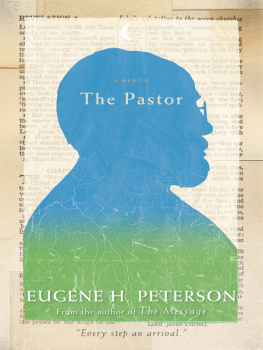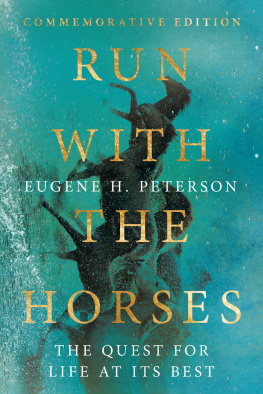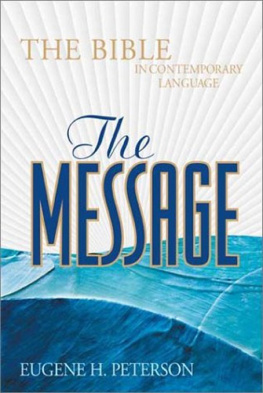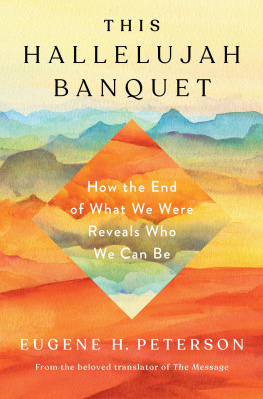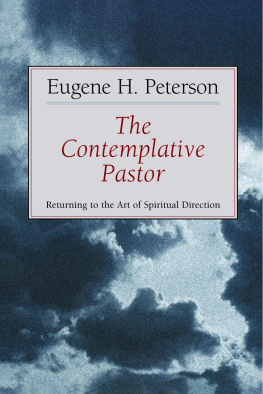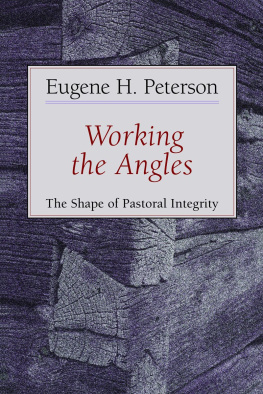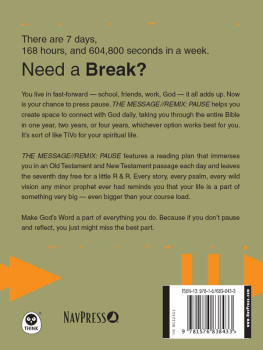Eugene H. Peterson - The Pastor
Here you can read online Eugene H. Peterson - The Pastor full text of the book (entire story) in english for free. Download pdf and epub, get meaning, cover and reviews about this ebook. year: 2011, publisher: HarperCollins, genre: Non-fiction. Description of the work, (preface) as well as reviews are available. Best literature library LitArk.com created for fans of good reading and offers a wide selection of genres:
Romance novel
Science fiction
Adventure
Detective
Science
History
Home and family
Prose
Art
Politics
Computer
Non-fiction
Religion
Business
Children
Humor
Choose a favorite category and find really read worthwhile books. Enjoy immersion in the world of imagination, feel the emotions of the characters or learn something new for yourself, make an fascinating discovery.
- Book:The Pastor
- Author:
- Publisher:HarperCollins
- Genre:
- Year:2011
- Rating:3 / 5
- Favourites:Add to favourites
- Your mark:
- 60
- 1
- 2
- 3
- 4
- 5
The Pastor: summary, description and annotation
We offer to read an annotation, description, summary or preface (depends on what the author of the book "The Pastor" wrote himself). If you haven't found the necessary information about the book — write in the comments, we will try to find it.
The Pastor — read online for free the complete book (whole text) full work
Below is the text of the book, divided by pages. System saving the place of the last page read, allows you to conveniently read the book "The Pastor" online for free, without having to search again every time where you left off. Put a bookmark, and you can go to the page where you finished reading at any time.
Font size:
Interval:
Bookmark:

For Jan
To insure the greatest efficiency in the dart,
the harpooners of this world
must start to their feet from out of idleness,
and not from out of toil.
Herman Melville
Pastor Pete
P astor Pete! Pastor Pete! Its Pastor Pete! The chorus of exclamations came from the mouths of half a dozen children, their faces pressed to the glass of our living-room window. These voicesexcited and clamorousentered my gut with a feeling of poignant loss. I knew that I would never hear myself addressed that way again Pastor.
Jan and I had left our Maryland congregation a year previous to the childrens chorus and had returned for a few days to complete arrangements to sell our house and move our belongings to another city across the continent. There I would be addressed as Professor. Together we had been pastor to this congregation for nearly thirty years. We had said our good-byes, many of them heart-wrenching. We didnt think we could handle any more emotion. Nobody knew we were back. We were trying to get in and out of town as inconspicuously as possible.
But we were discovered by the children. They were out trick-or-treating while we were at work in our living room getting ready for the arrival of the moving van in the morning. We had forgotten it was Halloween and had left our drapes open as we made our preparations. Masked and costumed, their noses pressed against the glass, they were unrecognizable as the children I had baptized, children of parents I had married, children whose grandparents I had buried over a span of three decades. But they recognized me: PastorPastor Pete.
I have no idea who started it, but many years before some of the young people in the congregation had begun calling me Pastor Pete. The usage soon filtered down to the children. Nobody had ever called me Pastor before. But as the years went on, I became accustomed to it and found that I rather liked it. Pastor.
Ours was an informal congregation, and, except for the children and youth, most of the people in it were older than I and addressed me by my given name, Eugene. Which was just fine by me. Somewhere along the way while growing up I developed a rather severe case of anticlericalism. I had little liking for professionalism in matters of religion. If I detected even a whiff of pomposity, I walked away. But Pastor , unlike Reverend or Doctor or Minister , especially when used by the youth and children, wasnt tainted with professionalism, at least to my ear. Pastor sounded more relational than functional, more affectionate than authoritarian.
T his book is the story of my formation as a pastor and how the vocation of pastor formed me. I had never planned to be a pastor, never was aware of any inclination to be a pastor, never knew what I was going to be when I grew up. And thenat the time it seemed to arrive abruptlythere it was: Pastor.
I cant imagine now not being a pastor. I was a pastor long before I knew I was a pastor; I just never had a name for it. Once the name arrived, all kinds of things, seemingly random experiences and memories, gradually began to take a form that was congruent with who I was becoming, like finding a glove that fit my hand perfectlya calling , a fusion of all the pieces of my life, a vocation: Pastor.
But it took a while.
I grew up in a Christian family and embraced the way of Jesus at an early age. Christian was a term that seemed as natural to me as my own name. Pastors were part of the landscape but never a significant part of it. In the small-town Montana world in which I was reared, they always seemed marginal to the actual business of living. The one pastor I respected in my growing-up years arrived too late to overcome the accumulation of indifference that in effect placed pastors on the margins of my life. I didnt take them seriously.
I took scripture seriously. I took Jesus seriously. I took church seriously. I took prayer seriously. But not pastors. For the most part, pastors seemed tangential to all that. In our congregation we had preachers and reverends, brothers and sisters, deeper-life teachers and evangelists, missionaries and revivalists and faith healers. But no pastors. By the time I entered adolescence, putting together fragments of overheard conversations among the adults, I concluded that pastors basically came to kill elk with their Winchester 30.06 rifles and catch rainbow trout on dry flies. They came and went regularly from our church. Two years was the usual tenurethree at most. They arrived and left like migrating geese. Some headed north to Canada in the spring where the conditions for adventure were congenial, others south to Mexico in the fall for the winter warmth and solace of sun and sand. Nearly everything of what they talked, preached, and taught had happened someplace else. And it was always glamorousremarkable miracles and visions. And conversions. As an adolescent, I envied the people who could tell stories of their dramatic conversions from lives of drink and drugs and assorted debaucheries. They were so much more interesting . I grew up in a church culture that made an art form of Damascus Road stories. Whenever I heard the storiesand I heard them frequentlyI felt so ordinary, so left out. But that didnt last long. After a while all the stories started sounding alike and took on a patina of banality.
They were good storytellers and accomplished publicists for the gospel. But they werent pastors. Mostly I liked them. But I never respected them. Outside of the morning our family spent with them each Sunday, nonethere was one significant exceptionseemed particularly interested in God. And I was beginning to get interested in God. But it never occurred to me to become a pastor.
As my world widened, nothing that I observed and experienced in pastors caused me to rethink my adolescent assessment. If anything, it confirmed it: being a pastor is not serious work. Within congregations the work of pastor seemed like a grab bag of religious miscellany. From among outsiders, the general attitude I picked up on was, at best, condescension, at worst, outright disrepute.
Later as a young adult, still attending church most Sundays, I found my way into a more congenial, at least to me, church culture. It wasnt as emotionally interesting as the one I had grown up in. I missed the melodrama. There was considerably less spontaneity and a much deeper sense of responsibility. Instead of emotional pleas for special offerings, supported by desperate stories of suffering and need, these churches had carefully prepared budgets to which people pledged their annual support. Spontaneity was elbowed to the sidelines by responsibility. The men and women in these pulpits were called doctor, head of staff, and minister. There was considerably less vagrancy. But still nothing that I would later identify as pastor.
I came across a poem by Denise Levertov in which she uses the phrase every step an arrival. She was giving an account of her development as a poet. I recognized in her phrase a metaphor for my own formation as a pastor: every step along the waybecoming the pastor I didnt know I was becoming and the person I now am, an essential component that was silently and slowly being integrated into a coherent life and vocationan arrival.
T here is also this to be said. North American culture does not offer congenial conditions in which to live vocationally as a pastor. Men and women who are pastors in America today find that they have entered into a way of life that is in ruins. The vocation of pastor has been replaced by the strategies of religious entrepreneurs with business plans. Any kind of continuity with pastors in times past is virtually nonexistent. We are a generation that feels as if it is having to start out from scratch to figure out a way to represent and nurture this richly nuanced and all-involving life of Christ in a country that knew not Joseph.
Font size:
Interval:
Bookmark:
Similar books «The Pastor»
Look at similar books to The Pastor. We have selected literature similar in name and meaning in the hope of providing readers with more options to find new, interesting, not yet read works.
Discussion, reviews of the book The Pastor and just readers' own opinions. Leave your comments, write what you think about the work, its meaning or the main characters. Specify what exactly you liked and what you didn't like, and why you think so.

